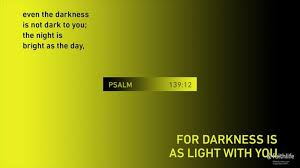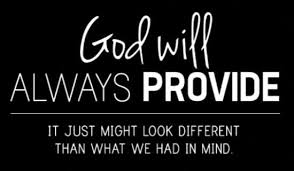Indeed, the darkness shall not hide from You, but the night shines as the day; The darkness and the light are both alike to You.
Psalm 139:12 (NKJ)
Children are typically afraid of the dark. It is in the dark where “things go bang in the night” and where unseen dangers may lie. Darkness is defined as the absence of visible light. Darkness is changed only by the introduction of light. One can never fully appreciate the value of light until they have experienced the unsettling feeling of being “in the dark.”
Although children fear the darkness, there is one time when they ignore that fear—when it’s time to play “hide and seek.” Darkness provides the “perfect condition” for its execution; it is in the darkness that a person can remain unseen as they blend into the trees’ shadows and the surrounding houses. If, however, this game were to be played with God, one would find themselves at a marked disadvantage. Why? Because darkness and light are alike to Him—the night shines as the day. It is God’s omnipresence that provides the believer the “perfect condition” for victory over darkness.
Light and darkness are a natural phenomenon associated with day and night. People also use the terms metaphorically, especially in Scripture where the two are given theological significance. In the Old Testament, God acted at Creation to separate and distinguish between darkness and light, night and day (Gen. 1:4, 5, 18). Darkness was also associated with judgment and distress (Ex.10:21; Ps. 91:6), God’s hiddenness (Dt. 4:11; 5:23) and divine intervention (Isa. 9:2; Ps. 18:28). Darkness is a powerful New Testament image. While darkness is used as a moral metaphor to describe sinful acts and sinful life style (Rom. 13:12; Eph. 5:11), it also used to describe the evil power, holding people in its dominion (Col. 1:13).
Darkness in our scripture text references the oppressive nature of darkness. “Hide” in Hebrew means to “to crush or bruise.” In the Old Testament it is used only here and in Genesis 3:15 and Job 9:17. Even believers feel spiritual darkness’ crushing power as it attempts to control them through their unredeemed flesh (Rom. 7:17-25). It is here that God’s omnipresence can lead believers to victory through darkness.
Darkness cannot hide. It is God’s presence (through His indwelling Spirit) that exposes and dispels darkness. Believers are rescued from the realm of darkness to become children of the light (Eph. 5:8, 14). They share a place in God’s kingdom of light (Col. 1:12) and even act as light in this dark world (Mat.5:14-16). The believer’s life reflects Jesus’ light and ultimately declare his praises (1 Pet. 2:9). It is in Christ that we have victory over darkness. Jesus Christ was the “change agent” that was introduced into darkness (Mat. 4:16) giving life and light to all who would receive it (Ps. 36:9).
The prophets promised that one day God Himself would live among men to replace the sun as their “everlasting light.” Isaiah 60:19-20 reads:
“The sun shall no longer be your light by day, Nor for brightness shall the moon give light to you; But the LORD will be to you an everlasting light, And your God your glory. Your sun shall no longer go down, Nor shall your moon withdraw itself; For the LORD will be your everlasting light, And the days of your mourning shall be ended.”
Praise God for His Light.




